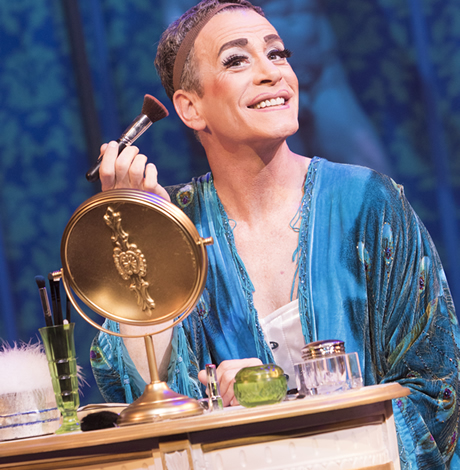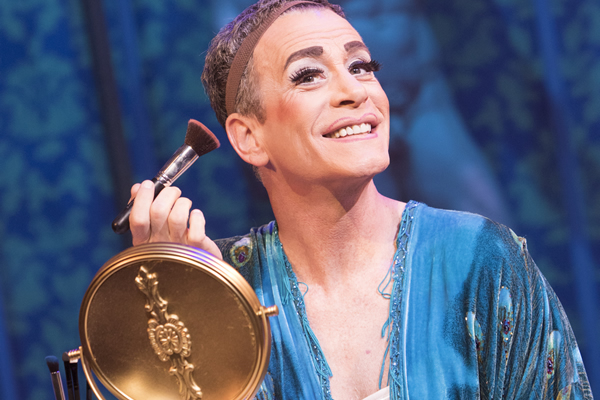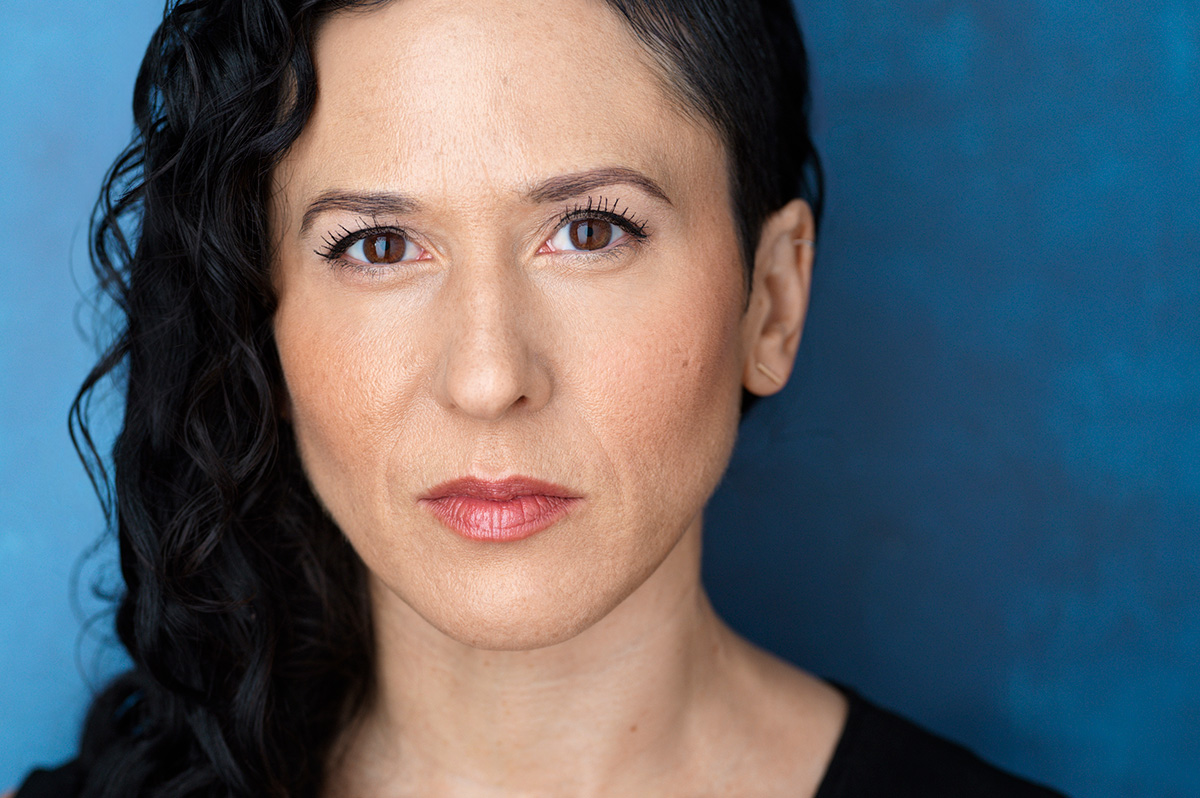Theater
Signature’s ‘La Cage’ joyous, bubbly
Camp musical revival shines in Signature’s able hands


Bobby Smith shines as Albin in Signature Theatre’s production of ‘La Cage Aux Folles.’ (Photo by Christopher Mueller; courtesy Signature)
‘La Cage Aux Folles’
Through July 10
Signature Theatre
4200 Campbell Avenue, Arlington
Tickets start at $40
703-820-9771
Signature Theatre’s production of “La Cage Aux Folles,” so confidently staged by out director Matthew Gardiner, falls right in line with composer Jerry Herman’s (“Hello, Dolly!,” “Mame”) cheery career intent of making people happy.
From the leads’ palpable chemistry to a café table’s yellow umbrella trimmed with magical fairy lights, it elicits bubbly bursts of joy. The top-notch cast elevates Harvey Fierstein’s campy but sincere libretto, and accompanied by an energetic orchestra led by Darius Smith reinvigorates Herman’s familiar score (“I Am What I Am,” “The Best of Times”).
“La Cage” opened on Broadway in 1983 and won six Tony Awards including Best Musical, Best Score and Best Book. It’s based on the 1973 French play by Jean Poiret, which in turn was inspired the popular French film and a successful American version, “The Birdcage.”
The story centers on suave Georges (the perfectly cast Brent Barrett), a San Tropez nightclub owner and his longtime lover, Albin (Bobby Smith), who as Zsa Zsa headlines the boite’s drag show. Together Georges, Albin and Jean Michel (Paul Scanlan), Georges’ son from a long-ago one-night stand, have lived happily on the Riviera as a family unit. But things take a turn when the young man announces his engagement to Anne (Jessica Lauren Ball), the sweet and open-minded daughter of an abrasive right-wing politician. He then asks his parents to play it straight for the in-laws. Mayhem and hilarity ensue.
In addition to directing, Gardiner is also choreographer. Numbers performed by the nightclub’s drag chorus, Les Cagelles, are a sensational nod to yesteryear with tap combinations, kick lines and high flying jumps that land in full splits. Occasionally a drag queen’s headdress slips or shoe flies, but these girls — all fabulously costumed in retro-showgirl mode by Frank Labovitz — always finish in style. Famous for singing “We are what we are, and what we are is an illusion,” Les Cagelles are typically depicted in varying degrees of realness depending on the production. Here, of the six chorines, all are passable from Row D center, except the purposely and amusingly butch Phaedra (Phil Young).
Because “La Cage” is in many ways a backstage story, set designer Lee Savage smartly takes us into the performers’ world. On each side of the filigree framed proscenium stage with Austrian-scalloped curtain and shell-covered footlights, the audience gets a glimpse offstage where the boy dancers are transforming themselves into fabulous showgirls. Upstairs Georges and Albin’s more-gaudy-than-grand flat features chandeliers, busy wallpaper, a bright blue chaise and a 10-foot stature of David.
As Albin, out actor Bobby Smith does some of his finest work ever. The part allows him to tap all of his talents — comedy, agility, acting and singing. His Albin is dramatic and sometimes petty, but always human and caring. His drag is old school glamour — think mature Arlene Dahl at a world premiere in Monte Carlo. But when things get rough, he doffs his wig and sings the anthem “I Am What I Am.” It’s a standalone song stirringly delivered with a real core of strength and courage in place of Zsa Zsa’s artifice.
The supporting cast includes DJ Petrosino as Jacob, the lisping, scantily clad, high heel-wearing butler who longs to get in the drag show. A very dignified and Gallic-looking Mitchell Hébert plays Anne’s overbearing father Edouard Dindon, and Sherri L. Edelen as his fun-starved wife, Marie. Nova Y. Payton plays Jacqueline, the diva owner of a nearby restaurant.
You won’t find the complexity of Sondheim here. “La Cage” is an old fashioned, feel-good show. And in light of Orlando, this LGBT life- and love-affirming musical is a timely thing.
Theater
‘Andy Warhol in Iran’ a charming look at intersection of art, politics
Mosaic production plumbs kidnapping plot of iconic artist for humor

‘Andy Warhol in Iran’
Through July 6
Mosaic Theater Company at Atlas Performing Arts Center
1333 H St., N.E., WDC
$70
Mosaictheater.org
Behind the blasé veneer, Andy Warhol was more curious than people knew. Particularly when it came to money. He kept a close eye on how the ultra-rich lived, what fellow artists were being paid and who was paying them, and, of course, all the new and more saleable ways of making and selling art.
In playwright Brent Askari’s “Andy Warhol in Iran,” now playing at Mosaic Theater Company, Warhol (Alex Mills) is brought outside of his usual area of interest when he lands face to face with a young revolutionary. While Warhol could be artistically revolutionary, he didn’t connect with the idea of forgoing the pursuit of money and fame for the infinitely more difficult task of achieving social justice.
The 90-minute play is not fully factual, but rather inspired by Warhol’s real life 1976 trip to Tehran to make portraits of the royal Pahlavi family in the waning days of their reign, with a focus on Farah Diba, the Shah’s elegant wife and Iran’s last empress.
The action unfolds in a Tehran hotel suite boasting a glorious view of the snowcapped Alborz Mountains not far from Iran’s vibrant and bustling capital. It’s here, disguised as room service, that Farhad (played by Nathan Mohebbi) gains entrance to Warhol’s rooms, seeking to kidnap the pop art star to garner attention for the university students’ movement.
Warhol meets the armed intruder with a sort of wide-eyed wonderment, flummoxed why he has been selected for abduction. Warhol can’t understand why a young man like Farhad wouldn’t prefer to be paid a big ransom on the spot, or be cast as a star in one of the Warhol Factory flicks.
When Farhad replies it’s because Warhol is the most decadent artist in the world, Warhol mistakenly takes it for the ultimate compliment. After all, his biggest successes had been connected to celebrity and consumerism (think Campbell’s Soup Cans. 1962).
For Warhol, decadence is aspirational. He made portraits of financiers, movie stars, and jet setters. In fact, he’d been obsessed with the lives of the rich and famous since he was a small kid in Pittsburgh thumbing through Photoplay Magazine while bed bound with Saint Vitus Dance.
Accompanying Warhol to Tehran (unseen) are his business manager Fred Hughes, and Bob Colacello, editor of Interview magazine. Together, they make a merry trio of gay social climbers. These kinds of trips were a boon to the artist. Not only did they solidify a new strata of high society contacts, but were also superbly lucrative, thickly padding the painter’s pockets.
While in Iran, Warhol wanted only to view Farah’s vast world-class collection of jewels, sample the caviar on tap, and get his Polaroids. Then he’d fly first class back to New York and transfer the images to silk screen and sell the portraits to the Persian royals at a hefty price. He didn’t foresee any obstacles along the way.
Serge Seiden’s direction is spot on. He’s rendered a wonderfully even two-hander with a pair of terrifically cast actors. And Seiden plumbs the piece for humor mostly drawn from the absurdity of the situation without missing any of the serious bits.
As Warhol, out actor Mills is instantly recognizable as the eccentric artist. He’s wearing the button-down shirt, jeans, blazer, glasses, and, of course the famed shock of white hair wig (here a little more Karen than Andy). His portrayal is better than an imitation. He gives a bit of the fey and confused, but has also infuses him with a certain dynamism.
The energy works well with the intensity of Mohebbi’s would-be kidnapper Farhad. And while it isn’t a romance, it’s not impossible to think that Warhol might fall for a handsome male captor.
The connection between art and politics is almost always interesting; and though not a super deep dive into the era or the life of an artist, “Andy Warhol in Iran” is a compelling, charming, and sometimes funny glimpse into that intersection.
Theater
‘Hunter S. Thompson’ an unlikely but rewarding choice for musical theater
‘Speaks volumes about how sad things land on our country’

‘The Untitled Unauthorized Hunter S. Thompson Musical’
Through July 13
Signature Theatre
4200 Campbell Ave., Arlington, Va.
$47 to $98
Sigtheatre.org
The raucous world of the counterculture journalist may not seem the obvious choice for musical theater, but the positive buzz surrounding Signature Theatre’s production of Joe Iconis’s “The Untitled Unauthorized Hunter S. Thompson Musical” suggests otherwise.
As the titular, drug addled and gun-toting writer, Eric William Morris memorably moves toward his character’s suicide in 2005 at 67. He’s accompanied by an ensemble cast playing multiple roles including out actor George Salazar as Thompson’s sidekick Oscar “Zeta” Acosta, a bigger than life Mexican American attorney, author, and activist in the Chicano Movement who follows closely behind.
Salazar performs a show-stopping number — “The Song of the Brown Buffalo,” a rowdy and unforgettable musical dive into a man’s psyche.
“Playing the part of Oscar, I’m living my Dom daddy activist dreams. For years, I was cast as the best friend with a heart of gold. Quite differently, here, I’m tasked with embodying all the toxic masculinity of the late ‘60s, and a rampant homophobia, almost folded into the culture.”
He continues, “My sexuality aside, I like to think that Oscar would be thrilled by my interpretation of him in that song.
“Our upbringings are similar. I’m mixed race – Filipino and Ecuadorian and we grew up similarly,” says Salazar, 39. “He didn’t fit in as white or Mexican American, and fell somewhere in the middle. Playing Oscar [who also at 39 in 1974 forever disappeared in Mexico], I pulled out a lot of experience about having to code switch before finally finding myself and being confident just doing my own thing.
“As we meet Oscar in the show we find exactly where’s he’s at. Take me or leave me, I couldn’t care less.”
In 2011, just three years after earning his BFA in musical theater from the University of Florida in Gainesville, Salazar fortuitously met Iconis at a bar in New York. The pair became fast friends and collaborators: “This is our third production,” says George. “So, when Joe comes to me with an idea, there hasn’t been a moment that I don’t trust him.”
In “Be More Chill,” one of Iconis’s earlier works, Salazar originated the role of Michael Mell, a part that he counts as one of the greatest joys of artistic life.
With the character, a loyal and caring friend who isn’t explicitly queer but appeals to queer audiences, Salazar developed a fervent following. And for an actor who didn’t come out to his father until he was 30, being in a place to support the community, especially younger queer people, has proved incredibly special.
“When you hear Hunter and Oscar, you might think ‘dude musical,’ but I encourage all people to come see it.” Salazar continues, “Queer audiences should give the show a shot. As a musical, it’s entertaining, funny, serious, affecting, and beautiful. As a gay man stepping into this show, it’s so hetero and I wasn’t sure what to do. So, I took it upon myself that any of the multiple characters I play outside of Oscar, were going to be queer.
Queer friends have seen it and love it, says Salazar. His friend, Tony Award-winning director Sam Pinkleton (“Oh, Mary!”) saw Hunter S. Thompson at the La Jolla Playhouse during its run in California, and said it was the best musical he’d seen in a very long time.
“Since the work’s inception almost 10 years ago, I was the first Oscar to read the script. In the interim, the characters’ relationships have grown but otherwise there have been no major changes. Still, it feels more impactful in different ways: It’s exciting to come here to do the show especially since Hunter S. Thompson was very political.”
Salazar, who lives in Los Angeles with his partner, a criminal justice reporter for The Guardian, is enjoying his time here in D.C. “In a time when there are so many bans – books, drag queens, and travel — all I see is division. This is an escape from that.”
He describes the Hunter Thompson musical as Iconis’s masterpiece, adding that it’s the performance that he’s most proud of to date and that feels there a lot of maturity in the work.
“In the play, Thompson talks to Nixon about being a crook and a liar,” says Salazar. “The work speaks volumes about how sad things land on our country: We seem to take them one step forward and two steps back; the performance is almost art as protest.”
Theater
A hilarious ‘Twelfth Night’ at Folger full of ‘elegant kink’
Nonbinary actor Alyssa Keegan stars as Duke Orsino

‘Twelfth Night’
Through June 22
Folger Theatre
201 East Capitol St., S.E.
$20-$84
Folger.edu
Nonbinary actor Alyssa Keegan (they/them)loves tapping into the multitudes within.
Currently Keegan plays the melancholic Duke Orsino in Folger Theatre’s production of Shakespeare’s romantic comedy “Twelfth Night.” Director Mei Ann Teo describes the production as “sexy, hilarious, and devastating” and full of “elegant kink.”
Washington-based, Keegan enjoys a busy and celebrated career. Her vast biography includes Come From Away at Ford’s Theatre; Cat on a Hot Tin Roof (Helen Hayes Award, Best Actress) and Paula Vogel’s How I Learned to Drive, both at Round House Theatre; Diana Son’s Stop Kiss directedby Holly Twyford for No Rules Theatre Company; and Contractions at Studio Theatre, to name just a few.
In addition to acting, Keegan works as a polyamory and ethical non-monogamy life and relationship coach, an area of interest that grew out of personal exploration. For them, coaching seems to work hand in hand with acting.
WASHINGTON BLADE: You’re playing the lovesick Orsino in Twelfth Night. How did that come about?
ALYSSA KEEGAN: The director was looking to cast a group of actors with diverse identities; throughout auditions, there were no constraints regarding anyone’s assigned sex at birth. It was really a free for all.
BLADE: What’s your approach to the fetching, cod-piece clad nobleman?
KEEGAN: Offstage I identify as completely nonbinary; I love riding in this neutral middle space. But I also love cosplay. The ability to do that in the play gives me permission to dive completely into maleness.
So, when I made that decision to play Orsino as a bio male, suddenly the part really cracked open for me. I began looking for clues about his thoughts and opinions about things like his past relationships and his decision not to date older women.
Underneath his mask of bravura and sexuality, and his firmness of feelings, he’s quite lonely and has never really felt loved. It makes sense to me why his love for Olivia is so misguided and why he might fall in love with the Cesario/Viola character.
BLADE: As an actor, do you ever risk taking on the feelings of your characters?
KEEGAN: Prior to my mental health education, yes, and that could be toxic for me. I’ve since learned that the nervous system can’t tell the difference between real emotional distress and a that of a fully embodied character.
So, I created and share the Empowered Performer Project. [a holistic approach to performance that emphasizes the mental and emotional well-being of performing artists]. It utilizes somatic tools that help enormously when stepping into a character.
BLADE: Has changing the way you work affected your performances?
KEEGAN: I think I’m much better now. I used to have nearly debilitating stage fright. I’d spend all day dreading going onstage. I thought that was just part of the job. Now, I’ve learned to talk to my body. Prior to a performance, I can now spend my offstage time calmly gardening, working with my mental health clients, or playing with my kid. I’m just present in my life in a different way.
BLADE: Is Orsino your first time playing a male role?
KEEGAN: No. In fact, the very first time I played a male role was at the American Shakespeare Center in Staunton, Va. I played Hipolito in Thomas Middleton’s The Revenger’s Tragedy.
As Hipolito, I felt utterly male in the moment, so much so that I had audience members see me later after the show and they were surprised that I was female. They thought I was a young guy in the role. There’s something very powerful in that.
BLADE: Do you have a favorite part? Male or female?
KEEGAN: That’s tough but I think it’s Maggie the Cat. I played the hyper-female Maggie in Tennessee Williams’ Cat on a Hot Tin Roof at Round House. In the first act she didn’t stop talking for 51 minutes opposite Gregory Wooddell as Brick who barely had to speak. That lift was probably the heaviest I’ve ever been asked to do in acting.
BLADE: What about Folger’s Twelfth Night might be especially appealing to queer audiences?
KEEGAN: First and foremost is presentation. 99% of the cast identify as queer in some way.
The approach to Shakespeare’s text is one of the most bold and playful that I have ever seen. It’s unabashedly queer. The actors are here to celebrate and be loud and colorful and to advocate. It’s a powerful production, especially to do so close to the Capitol building, and that’s not lost on any of us.
-

 U.S. Supreme Court4 days ago
U.S. Supreme Court4 days agoSupreme Court upholds ACA rule that makes PrEP, other preventative care free
-

 U.S. Supreme Court4 days ago
U.S. Supreme Court4 days agoSupreme Court rules parents must have option to opt children out of LGBTQ-specific lessons
-

 National5 days ago
National5 days agoEvan Wolfson on the 10-year legacy of marriage equality
-

 Congress5 days ago
Congress5 days agoSenate parliamentarian orders removal of gender-affirming care ban from GOP reconciliation bill












